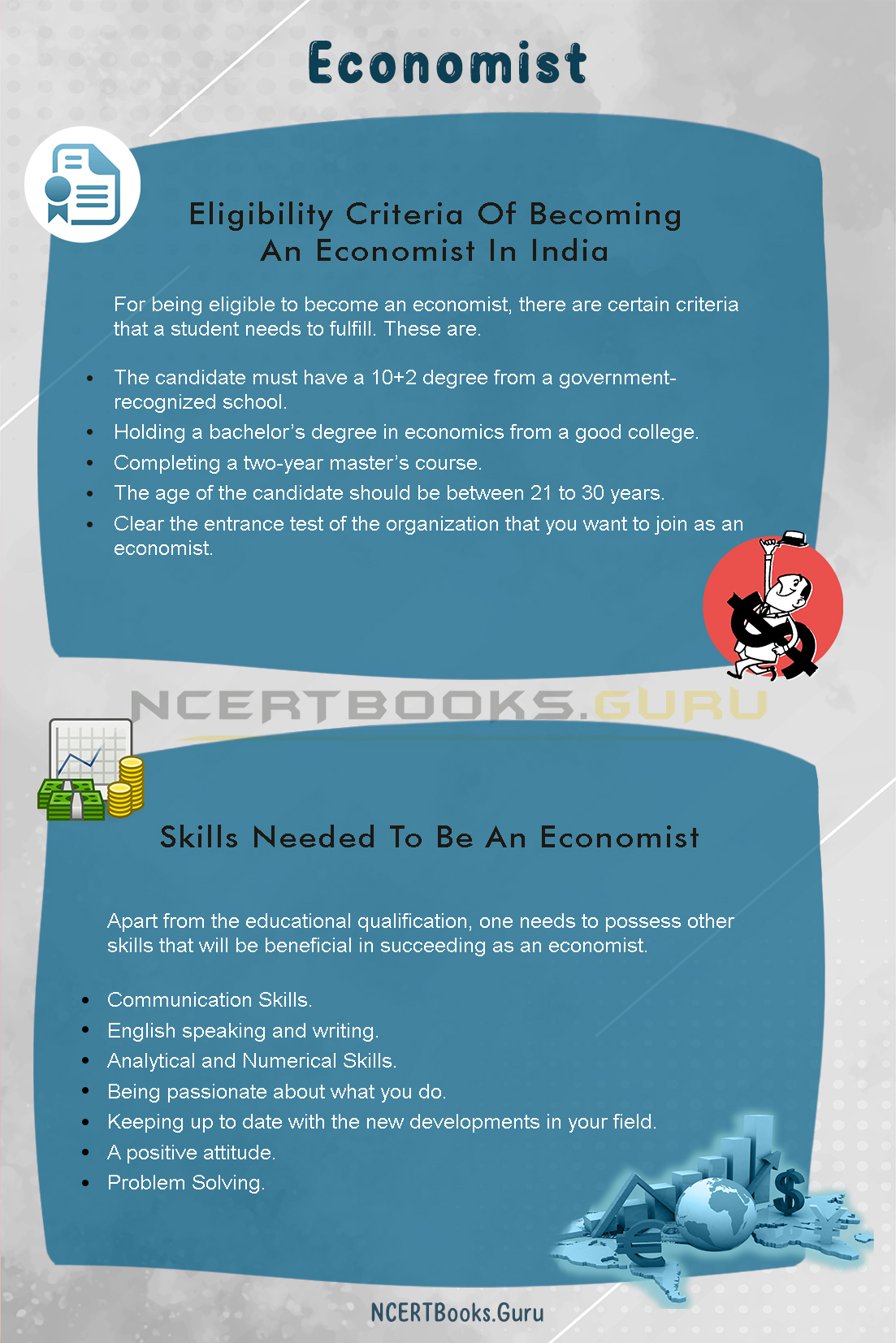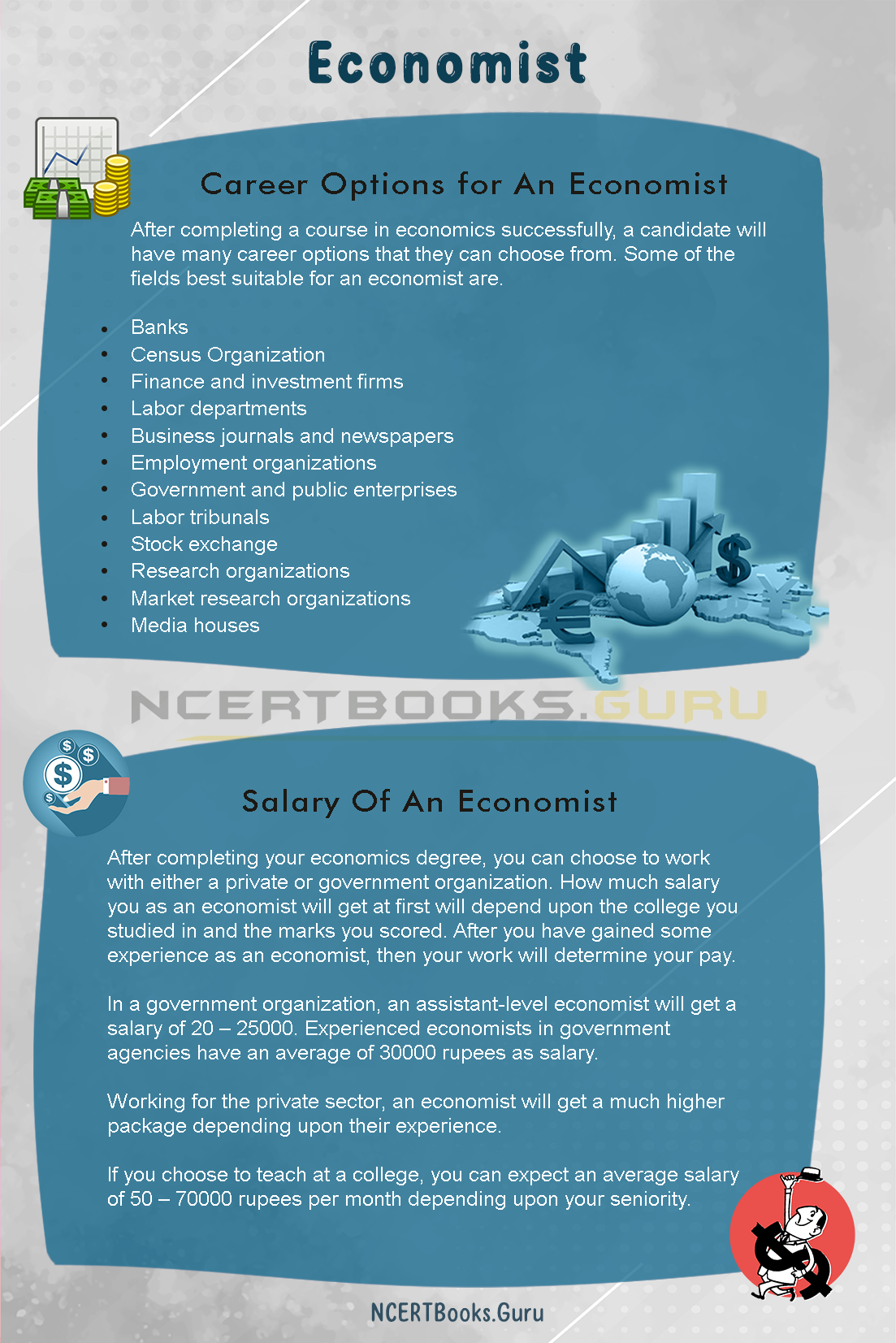How to Become An Economist in India?: Economic growth means that the country’s income is growing, consumption of goods and services is increasing, and people’s living standards are rising. A country’s growth is directly dependent on its economic growth, which has led to an increase in demand for economists.
Refer to Course Details to know more about related courses and find details like Admission Process, Eligibility Criteria, etc.
Refer to Course Details to know more about related courses and find details like Admission Process, Eligibility Criteria, etc.
Many companies and businesses realize the benefit of hiring an economist. This increased the potential of a better job opportunity and a lot of scope in this field, attracting students. If your country’s economy is something you’re passionate about, then knowing how to become an economist in India will help you tremendously.
- Who is an Economist?
- Eligibility Criteria Of Becoming An Economist In India
- Skills Needed To Be An Economist
- Top Institution In India Where You Can Study Economics
- List Of Entrance Exams for Becoming An Economist
- Courses Available In Economics
- Different Types Of Economists
- Career Options for An Economist
- Job Opportunities for Economists
- Salary Of An Economist
- Conclusion
Who is an Economist?
Economists are the ones who study and analyze statistics and data and, based on their analysis, forecast how the economy of the country will take shape in the coming future. They act as guides for governments and organizations to make financial decisions to achieve the growth target. They also aid them in deciding on policies for the betterment of a country’s economy.
Eligibility Criteria Of Becoming An Economist In India
For being eligible to become an economist, there are certain criteria that a student needs to fulfill. These are.
- The candidate must have a 10+2 degree from a government-recognized school.
- Holding a bachelor’s degree in economics from a good college.
- Completing a two-year master’s course.
- The age of the candidate should be between 21 to 30 years.
- Clear the entrance test of the organization that you want to join as an economist.

Skills Needed To Be An Economist
Apart from the educational qualification, one needs to possess other skills that will be beneficial in succeeding as an economist.
- Communication Skills.
- English speaking and writing.
- Analytical and Numerical Skills.
- Being passionate about what you do.
- Keeping up to date with the new developments in your field.
- A positive attitude.
- Problem Solving.
Top Institution In India Where You Can Study Economics
There are several colleges and institutions in India which offer economics courses. Try to choose the colleges with the best ranking and reputation. Not only do they have the best faculty to offer you proper guidance and knowledge, but they will also help you score a well-paying job soon after completion of your course. Some of the best colleges in India where you can study economics are.
- Shri Ram College Of Commerce, New Delhi
- Stephens College, New Delhi
- HR College Of Commerce And Economics, Mumbai
- Loyola College, Chennai
- Thakur College Of Science And Commerce, Mumbai
- Presidency College, Kolkata
- Shantiniketan Group Of Colleges, Bengaluru
- Lady Shri Ram College of Women, New Delhi
- M.O.P. Vaishnav College For Women, Chennai
- Delhi School of Economics, New Delhi
- SIES College Of Arts, Science And Commerce, Mumbai
- Xaviers College, Mumbai
- R Institute of Commerce and Economics, Mumbai
- Narsee Monjee College Of Commerce And Economics, Mumbai
- Banaras Hindu University, Varanasi
See More:
List Of Entrance Exams for Becoming An Economist
There are two different ways you can get admission in a course for studying economics. Some colleges use your 10+2 marks to prepare a merit list based on the number of applications. Others have an entrance examination that you would need to qualify to get admission. Some colleges might consider your marks from 10+2 and the marks scored by you in the entrance exam to prepare a merit list. Some of the entrance exams conducted by top colleges of India are.
- DUJAT, Delhi University Joint Admission Test: An entrance test you need to qualify for admission in Delhi University colleges.
- NPAT, National Test for Programs After Twelfth: It is a university-level entrance test that you need to qualify for getting admission in Narsee Monjee College Of Commerce And Economics, Mumbai.
- SET, State Level Eligibility Test: A state-level exam conducted by several states for hiring an economics lecturer or professor.
- CUET, Christ University entrance Test: An entrance test conducted twice a year by Christ University for admission in economics courses.
- IPU-CET, Indraprastha University Common Entrance Test: An entrance test you need to qualify for getting admission in UG or PG courses in economics in Indraprastha University.
- DU DSE, Delhi University Delhi School Of Economics: An entrance test explicitly conducted for admission in Delhi School Of Economics.
- ISI Admission Test, Indian Statistical Institute Admission Test: You need to qualify for this entrance test for admission to Indian Statistical Institute.
- JNU Entrance Test: An entrance test for admission to Jawaharlal Nehru University, Delhi
Courses Available In Economics
For building a career as an economist, you would need to have studied economics. There are a wide variety of courses that you can choose depending upon your qualifications and interest.
If you have just completed your 10+2, then getting an admission in a bachelor’s course for economics would be the right path for you to become an economist. You can do any of these courses for your bachelor’s degree.
- B.Com. in Business Economics – 3 years course
- B.Com. in Applied Economics – 3 years course
- B.A. in Business Economics – 3 years course
- BBE – 3 years course
After completing your bachelor’s degree, you would need to do a postgraduate program in economics. You have these options for your master’s that you can do.
- M.Com. in Applied Economics – 2 years course
- M.A. in Economics – 2 years course
- M.Sc. in Financial Economics and Administration – 2 years course
- M.Phil. in Business Finance & Economics – 2 years course
Getting a Ph.D. degree would open the doors for you to enter the teaching profession if you ever wish to do so.
- Ph.D. in Business Economics – 2 years course
Admission Procedure
All the top colleges, whether they are private or government, have two procedures for admission.
- Selection By Merit List
For admission in a bachelor’s program, the colleges prepare a merit list based on the marks obtained by students in 10+2. Anyone scoring a good percentile would have a better chance of getting an admission.
For masters, the colleges consider the marks obtained by students in their bachelor’s degree.
- Selection By Entrance Exam
In this mode of admission, any student interested in getting access to any particular college will have to sit in the entrance exam taken by that college and qualify for it.
- Combination Of Both
Some colleges prepare their merit list based on the marks scored by a student in 10+2 or graduation and the marks scored in the entrance examination.
Course Fee
The fee of studying economics will depend upon the college and the course you will choose.
Doing a bachelor’s degree in a government college can cost you anywhere from 25000 to 10000 rupees for the whole course. The government runs several scholarship schemes for economically weaker classes. If you choose to do your course at a private institute, then it can cost you more.
On average, doing any course in economics will cost you around 25000 to 3 lakhs. Annum.
Different Types Of Economists
After completion of your studies, there are a lot of different economists jobs that you can take. Some of them are.
- Research Economist: Their job is developing mathematical models and explaining their essential elements like demand and supply chain. They use statistics, mathematics and apply principles of economics to do so.
- Industrial Economist: Their job is related to studying the organizational structure of any industry and improving the company’s profit by applying the principles of economics. As an economist, it should be their responsibility to increase the company’s income.
- Financial Economist: The job of a financial economist is to set the monetary policy and predicting the economic performance of a country in the future.
- Business administrator: An economist working as a business administrator would be responsible for setting a company policy. Regulation of various areas of international trade policy also comes under their domain.
- Labor’s Economist: Working as a labor economist would require an economist to manage the supply of laborers corresponding to the demand by employers. Setting up policies for the wages of laborers and their welfare is also a task of a labor economist.
There are many options for an economist, and you can choose the one that you like.
Career Options for An Economist
After completing a course in economics successfully, a candidate will have many career options that they can choose from. Some of the fields best suitable for an economist are.
- Banks
- Census Organization
- Finance and investment firms
- Labor departments
- Business journals and newspapers
- Employment organizations
- Government and public enterprises
- Labor tribunals
- Stock exchange
- Research organizations
- Market research organizations
- Media houses
Job Opportunities for Economists
Many companies, businesses, and organizations, both private and government, hire economists to analyze and predict future sales and business. Some of the top recruiters hiring for economists are.
- Reserve Bank Of India
- Rest other public and private banks in India
- Indian Econmic Services
- SEBI
- LIC
- Economic Times
- CNBC
- HSBC
- Business India
Salary Of An Economist
After completing your economics degree, you can choose to work with either a private or government organization. How much salary you as an economist will get at first will depend upon the college you studied in and the marks you scored. After you have gained some experience as an economist, then your work will determine your pay.
In a government organization, an assistant-level economist will get a salary of 20 – 25000. Experienced economists in government agencies have an average of 30000 rupees as salary.
Working for the private sector, an economist will get a much higher package depending upon their experience.
If you choose to teach at a college, you can expect an average salary of 50 – 70000 rupees per month depending upon your seniority.

Conclusion
With the governments and organizations realizing the importance of economists, this field has a lot of scopes. However, the path of becoming a successful economist is not easy, and a candidate would need to work hard for it. If you want to make a career as an economist, you need to start right after completing your 10+2. Follow the steps discussed in the article to achieve your dream.
